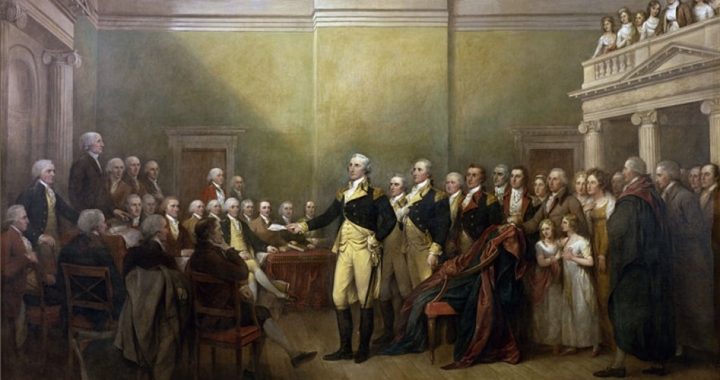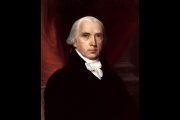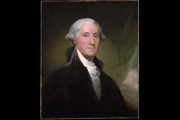
“I’ll be home for Christmas.” A catchy, albeit melancholy holiday tune. Two hundred and twenty-nine years ago this month, General George Washington sat inside his cold command tent and promised his long-suffering wife Martha that he would indeed be home for Christmas.
If he made it home, it would be the first time in over a decade. Since being commissioned as commander-in-chief of the Continental Army following the battles of Lexington and Concord in 1775, Washington had served his country constantly, never leaving the field of battle.
As they sat in his tent in Newburgh, New York, Washington reluctantly rose and sent Martha on ahead to Mt. Vernon, reassuring her that he would be home in time to pour the Christmas cordial in her glass.
For his part, the retiring general faced enduring a month-long journey before he would see her again. If Washington was going to keep his promise, he had a few important tasks to accomplish. He was to accept the transfer of control of New York City from the English, say goodbye to his men, and probably most important in Washington’s mind, he would officially resign his commission and give his final report to Congress then meeting in Annapolis, Maryland — and he would do it all in less than one month. The first stop on the road home was New York City.
On September 3, 1783, the Treaty of Paris was ratified by British negotiators in France, and the wheels of the occupiers’ departure from the newly recognized American Republic were set in motion. Although British troops occupied forts in America for another decade, in New York City, the redcoats gladly evacuated their American barracks and outposts, boarding ships bound for their longed-for island home.
While accomplishing his necessary duties in New York, Washington delivered the first of several farewells. This one was to what remained of his cadre of commanders and took place on December 4, 1783, at the popular public house, Fraunces Tavern.
Anxious to get some road behind him in the daylight, Washington awoke earlier than usual, and in turn woke his host and asked Fraunces to prepare the Long Room for a luncheon for the general and his officers to be held that day at noon.
Washington entered the Long Room at the stroke of 12:00 and, despite his estimates, found the room packed to capacity by a devoted and admiring corps of officers. Washington was dressed in his best uniform (blue with buff trim and bright brass buttons). He quickly surveyed the faces that in turn focused, each and every one, on the face of their commander and the man universally considered the liberator of a nation. For his part, Washington recognized and rejoiced that all men in attendance were in word and deed officers and gentlemen, for they had all sacrificed to the furthest extent of their means and endured a roster of remarkable hardships together as brothers-in-arms. No exceptions, not even the general himself.
As always, the assembled veterans deferred to their commanding officer, waiting for his signal to begin eating the cold cuts and drinking the brandywine set out dutifully by Fraunces. Washington, feeling himself fill with fraternal affection for his fellow officers, motioned for the men to tuck in to the fare and fill their glasses.
As wine was poured into the last glass, Washington swallowed hard, inclined his head as if simultaneously suppressing tears, and focused his swirling thoughts. Then, with some effort to overcome the emotion, he raised his glass with his right hand, noticeably choked back tears, and offered the following heartfelt toast that was as dignified and inspiring as the speaker himself. “With a heart filled with love and gratitude, I now take leave of you. I most devoutly wish that your latter days may be as prosperous and happy as your former ones have been glorious and honorable.” The men tried clumsily to clink glasses, as they were overcome with debilitating melancholy at the thought of never seeing their retiring commander again.
Washington’s eyes welled with tears that testified to his genuine emotion, and he asked the congregated soldiers to “come and take me by the hand.” Obediently, one by one beginning with the portly and powerful hero of Ticonderoga, Henry Knox (he being the senior officer), the solemn soldiers approached Washington, clasped his hand, and kissed him on the cheek in an unashamed display of admiration. The details of this scene were described in a letter by one of the attendees, Lieutenant Colonel Tallmadge of the Second Continentals:
Such a scene of sorrow and weeping I had never before witnessed…. It was too affecting to be of long continuance — for tears of deep sensibility filled every eye — and the heart seemed so full, that it was wont to burst from its wonted abode. The simple thought that we were then about to part from the man who had conducted us through a long and bloody war, and under whose conduct the glory and independence of our country had been achieved, and that we should see his face no more in this world seemed to me utterly unsupportable.
After individually embracing and saluting each of his men, General George Washington turned to exit the Long Room and paused at the door to wave goodbye for the last time.
After making stops in New Jersey, Philadelphia, and Baltimore, George Washington headed for Annapolis to do what many thought he would never do — voluntarily relinquish his command of the military to civilian authorities.
On December 23, 1783, he did just that. His resignation was an act so unheralded that King George III of England was brought to call his erstwhile foe “the greatest character of his age.”
On the appointed day — just 48 hours left if he was to keep his promise to his beloved — Washington entered the Maryland State House and addressed Thomas Mifflin, the president of Congress:
Mr. President, the great events on which my resignation depended having at length taken place; I have now the honor of offering my sincere Congratulations to Congress and of presenting myself before them to surrender into their hands the trust committed to me, and to claim the indulgence of retiring from the Service of my Country. Having now finished the work assigned me, I retire from the great theatre of Action; and bidding an affectionate farewell to this august body under whose orders I have so long acted, I here offer my commission, and take my leave of all the employments of public life.
At this, Washington pulled out of his pocket the parchment commission from 1775 and handed it to Mifflin — mission accomplished.
Washington’s peaceable and uncompelled delivery of his command demonstrated his dedication to liberty in spite of offers of a throne and crown. This one act is but a snapshot in a large album of similar scenes that capture Washington’s nobility, humility, unwavering virtue, and dedication to republicanism.
Later that day — Christmas Eve — Washington and company ferried across the Potomac and drove up the road that led to Mt. Vernon.
Having had his fill of parties, Washington arranged with Martha to have an intimate family Christmas with a meal of turkey, hog, cider, and wine, attended only by step-children, nieces, nephews, and other close kin. From New York City and Philadelphia, Washington brought presents for everyone. There were a locket and umbrella for Martha; books and spinning toys for the boys; and tea sets and gingerbread toys for the girls. In the company of this tiny gathering, the civilian George Washington shared stories and a meal worthy of the “Father of His Country.” He was now, however, more happily and proudly serving as the father of his family.
Painting: General George Washington Resigning His Commission, by John Trumbull
Joe A. Wolverton, II, J.D. is a correspondent for The New American and travels frequently nationwide speaking on topics of nullification, the NDAA, and the surveillance state. He can be reached at [email protected].



